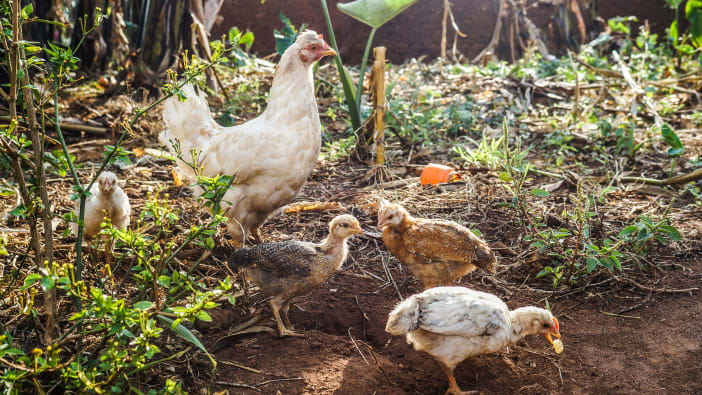by Nimaya Kenyi Mogga.
ACCOMPLISH is a local NGO in Terekeka District in southern Sudan. They have established a paravet project to improve animal health care in the area.
The inhabitants of Terekeka belong to the Mundari tribe and are pastoralists with large herds of cattle, sheep and goats. Besides providing milk and occasionally meat for the family diet, livestock are kept for prestige, payment of bride price, ceremonial rituals and payment of compensations. They are also used as an insurance or bank to safeguard against unexpected environmental problems such as droughts or floods. Animals can be sold or exchanged for grain and other necessities.
Livestock diseases are a major problem for farmers. Outbreaks of rinderpest, haemorrhagic septicaemia and contagious pneumonia result in many deaths. Tickborne diseases, trypanosomiasis and internal and external parasites result in poor production and sometimes death.
The Mundari use traditional treatments to treat diseases in their stock, but they also use modern medicines like antibiotics and worming medicines.
There are no veterinary services or trained vets stationed in the area, so the cattle owners normally have to move long distances to obtain livestock medicines. Vaccination campaigns launched by government veterinary staff are never very effective due to poor facilities in the local veterinary department, bureaucracy and the inaccessibility of the area to veterinary staff during the rainy season between April and November.
The project was therefore set up to select and train paravets from amongst the cattle owners to carry out treatment and vaccination of their stock. Medicine supplies were also set up on a revolving funds basis.
Selection and training
Candidates were selected from among the cattle owners of every chieftainship. The number chosen in each chieftanship was determined by the size of the area and the number of livestock in the area. Criteria for selection included…
- an ability to work hard
- honesty
- knowledge of traditional livestock care, livestock diseases and their traditional cures.
The candidates did not have to be literate, but skills in numeracy were important for giving correct doses of medicines. These people were then collected together and trained. The subjects taught included identifying the different diseases from their symptoms, treatments for disease, correct administration of medicines, hygienic handling of medicines, equipment and tools, operation of a cold-chain system for vaccines and reporting.
The paravet activities
After training, the paravets set to work in their communities. Each is provided with a bicycle and veterinary kit. Four centres were established in the district with stocks of medicines and cold-chain equipment. Each centre is controlled by a supervisor. From time to time the paravets come to the centre to report, pay in money for the medicines used and collect more supplies of medicines. Each year the paravets come together for refresher training in animal health and other husbandry methods.
The paravets receive a small payment for each medicine they sell. They collect this money when restocking with new medicines. So the more medicines they sell the more they receive. A government veterinary officer helps the organisation to supervise the paravets’ activities, order medicines for them and organise training.
Achievements
Despite disturbances caused by the civil war in the project area, the activities have continued with few problems. The project now has about thirty trained paravets of which three are women. The main concern has been a fairly high turnover among the literate paravets due to the training received which has exposed them to new horizons and job opportunities.
We have been able to build up a sustainable revolving fund for medicine supplies in the district. No outbreak of rinderpest disease has been reported since the establishment of the project. Outbreaks of other diseases are attended to immediately. Confidence has been built between the paravets and the cattle owners who are now willing to accept new medicines supplied by the paravets. In the past, cattle owners selected only medicines with trademarks which they recognised.
Nimaya Kenyi Mogga is a Livestock Officer with ACCOMPLISH, c/o OXFAM UK/1, PO Box 3182, Khartoum, Sudan.







